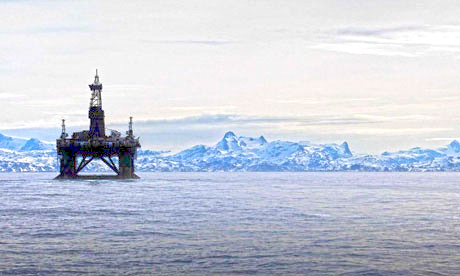We lionise people of action, but they don’t always deliver what’s needed. [24 April 2012 | Peter Boyer]

The insurance industry is openly questioning the environmental risks associated with Arctic Ocean drilling. PHOTO GUARDIAN NEWSPAPER
It’s a funny thing that while our waistlines expand along with our aversion to exercise, we seem to be hearing and talking more than ever about the tough guy, the no-fat, no-nonsense, hard-working pioneer who gets things done.
Our long-cherished stories of men and women of action, from the bush hut and the Snowy River through Galipoli and Kokoda to Crocodile Dundee, were about people who knew what it was to live by the sweat of their brow.
Today, further removed than we’ve ever been from such harsh realities as hunting for meat, tilling the soil, fetching the water and firewood, it seems we’re prepared to accept pretty well anyone who puts up their hand to claim that when the going gets tough, they get going.
Seeing the bulging bodies and puffy jowls of some celebrated captains of Australian mining enterprise (no names, but they’re always in the news), it’s strange to think that they’ve been widely promoted, even self-promoted, as the latest in a long line of tough, outdoorsy Australian pioneers.
For a political example you can’t go past Russian President Vladimir Putin, whose well-publicised physical exploits include formula-one driving, horse-riding, Arctic swimming, judo (winning, of course), sedating a Siberian tiger, deep-water diving and arm-wrestling at a summer youth camp. Tony Abbott, eat your heart out.
It seems that the further modern life shields us from physical reality, the more we’re inclined to lionise those in the world’s halls of politics and industry who claim to be out there on the front line — men and women of action, ready, willing and able to do whatever it takes.
We extend this to the world’s extractive industries. Getting their riches from the earth, whether minerals for manufacturing or fossil energy as oil, coal and gas, these corporations present themselves as our action people, our “can-do” organisations.
Almost by definition, government tax and regulatory regimes are presented as “anti-action”, represented by bureaucrats sitting in stuffy city offices seeking to put limits on the only people prepared to get off their bums.
The same imagery has been used by both businesspeople and politicians to contrast their own action image with conservationists, presented as deskbound dogs-in-the-manger, happy so long as nothing is ever done. All pretty shallow and facile, but in the PR game it’s a proven winner.
No-nonsense Putin (like our own no-nonsense action man Senator Barnaby Joyce) has expressed scepticism about a threat from human-induced climate change. That mindset leaves a clear pathway for the action corporations to do whatever they say needs to be done.
The high-stakes business of increasingly-scarce fossil energy is now demanding some significant environmental intrusions, such as the fracturing of deep rock formations to release natural gas, large-scale surface mining to extract oil from tar sands, and deep ocean drilling.
Liquid crude oil remains the holy grail of the energy industry, and the Arctic Ocean may hold a quarter of the world’s remaining reserves. That’s irresistible to the likes of Putin, not to mention the governments of Canada and Norway and regional administrations in Alaska and Greenland.
Already threatened by rising temperatures and diminishing sea ice, the Arctic is facing extra stress from ventures proposed by multinationals Cairn Energy and Shell (interested in waters off Greenland and Canada), and the French company Total (focusing on Russia’s Barents Sea), with the active collusion of governments.
Enter the party-poopers. In a report aimed squarely at the Arctic hydrocarbon high-rollers, the world’s biggest insurance broking house, Lloyds of London, has warned of the Arctic’s “challenging and unpredictable” conditions with amplified risks of physical consequences and a “controversial and fluid” political and legal environment.
The many problems with oil drilling in the deep waters of the Arctic Ocean include the sheer physical challenge of working in freezing, often stormy conditions, through a shifting, changing layer of floating ice and thousands of metres of ocean water, and the related problems presented by the need to protect the Arctic’s unique life systems.
The report found a high likelihood that the region’s ecosystems, already highly stressed by rising Arctic temperatures, would be further affected by the introduction of deep-water oil drilling.
These concerns aren’t to be taken lightly. The catastrophic spill in 2010 from the Deepwater Horizon field in the Gulf of Mexico rang alarm bells for the insurance industry. It’s now being asked to insure against mishaps in a much more hostile region where environmental recovery is a slower and more uncertain process than in tropical waters.
It’s vital, says Lloyds, that scientific research be pursued ahead of any extraction activity to reduce the many knowledge gaps in such ventures. Environmental observers have gone further in saying that no amount of compensation would be enough to justify the risk of drilling.
The insurance industry may determine whether the cherished dreams of the political and business interests involved in this extreme Arctic adventure come to anything. The threat of having to carry the potentially crippling cost of failure may prove a step too far. But don’t count on it.
Leadership is part of this war of words, as it’s been part of the debate about human-induced warming. Those pushing the boundaries of fossil fuel extraction argue that our real leaders are the can-do action men out there in the wilderness, working their butts off to save our creature comforts.
That’s okay if you define leadership by action alone, but forget it if, like me, you see thinking as part of the mix.
